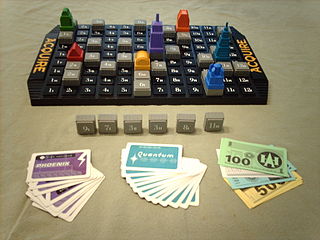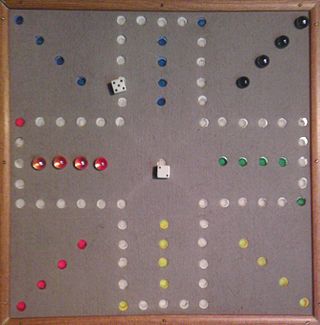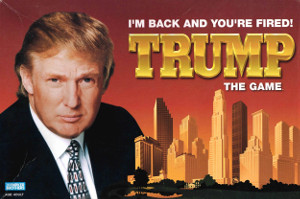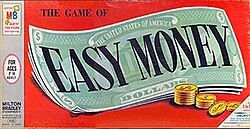
Acquire is a board game published by 3M in 1964 that involves multi-player mergers and acquisitions. It was one of the most popular games in the 3M Bookshelf games series published in the 1960s, and the only one still published in the United States.

Monopoly is a multi-player economics-themed board game. In the game, players roll two dice to move around the game board, buying and trading properties and developing them with houses and hotels. Players collect rent from their opponents and aim to drive them into bankruptcy. Money can also be gained or lost through Chance and Community Chest cards and tax squares. Players receive a salary every time they pass "Go" and can end up in jail, from which they cannot move until they have met one of three conditions. House rules, hundreds of different editions, many spin-offs, and related media exist. Monopoly has become a part of international popular culture, having been licensed locally in more than 103 countries and printed in more than 37 languages. As of 2015, it was estimated that the game had sold 275 million copies worldwide. The original game was based on locations in Atlantic City, New Jersey, United States.

Candy Land is a simple racing board game published by Hasbro. The game requires no reading and minimal counting skills, making it suitable for young children. No strategy is involved as players are never required to make choices; only following directions is required. About one million copies per year are sold.

Charles Brace Darrow was an American board game designer who is credited as the inventor of the board game Monopoly. Although the original idea for the game came from Lizzie Magie's The Landlord's Game, Darrow has been credited as the creator by Parker Brothers, the game's publisher.

Elizabeth J. Magie Phillips was an American game designer, writer, feminist, and Georgist. She invented The Landlord's Game, the precursor to Monopoly, to illustrate teachings of the progressive era economist Henry George.

SolarQuest is a space-age real estate trading board game published in 1985 and developed by Valen Brost, who conceived the idea in 1976. The game is patterned after Monopoly, but it replaces pewter tokens with rocket ships and hotels with metallic fuel stations. Players travel around the Sun acquiring monopolies of planets, moons, and man-made space structures. They seek to knock their opponents out of the game through bankruptcy, as well as optional laser blasts and dwindling fuel supplies.
Monopoly Junior is a simplified version of the board game Monopoly, designed for young children, which was originally released in 1990. It has a rectangular board that is smaller than the standard game and rather than using street names it is based on a city's amusements to make the game more child-friendly. There are many different models of the game.

Monopoly Tycoon is a construction and management simulation PC game published in 2001 by Infogrames Interactive and developed by Deep Red Games. The player operates a business that owns stores and apartments in a city derived from the Monopoly board game. Instead of using dice, the game relies more on the speed and innovativeness of the players. In the standard mode, the user plays against the AI opponents. In the multiplayer version, players go against other online players in order to gain victory.

The Landlord's Game is a board game patented in 1904 by Elizabeth Magie as U.S. Patent 748,626. It is a realty and taxation game intended to educate users about Georgism. It is the inspiration for the 1935 board game Monopoly.

Monopoly: The Card Game is loosely based on the board game Monopoly. The idea is to draw, trade and organize cards into "color-groups" along with bonus cards. Players take turns drawing and discarding cards until one completes a hand. The value of each player's hand is then counted and they receive the amount of Monopoly money they have earned. The first person to collect $10,000 wins.

The board game Monopoly has its origin in the early 20th century. The earliest known version, known as The Landlord's Game, was designed by Elizabeth Magie and first patented in 1904, but existed as early as 1902. Magie, a follower of Henry George, originally intended The Landlord's Game to illustrate the economic consequences of Ricardo's Law of economic rent and the Georgist concepts of economic privilege and land value taxation. A series of board games was developed from 1906 through the 1930s that involved the buying and selling of land and the development of that land. By 1933, a board game had been created much like the modern version of Monopoly sold by Parker Brothers and its related companies through the rest of the 20th century, and into the 21st. Several people, mostly in the midwestern United States and near the East Coast of the United States, contributed to design and evolution.

Finance, or The Fascinating Game of Finance or Finance and Fortune, is a board game originally released in 1932. The game is based on The Landlord's Game in the movement of pieces around the board, the use of cards, properties that can be purchased, and houses that can be erected on them. The game also has railroads; however, these may not be purchased. The game is a predecessor to Monopoly.

Aggravation is a board game for up to four players and later versions for up to six players, whose object is to be the first player to have all four playing pieces reach the player's home section of the board. The game's name comes from the action of capturing an opponent's piece by landing on its space, which is known as "aggravating". The name was coined by one of the creators, Lois Elaine, who did not always enjoy defeat.
Masterpiece is a board game by Parker Brothers, now a brand of Hasbro. Players participate in auctions for famous works of art. It was designed by Joseph M. Burck of Marvin Glass and Associates and originally published in 1970 by Parker Brothers, and then published again in 1976 and 1996. The game is now out of print. In this game, players compete with other players to bid on potentially valuable paintings, and negotiate with other players to trade these works of art, build a portfolio, amass money, and win the game. The top value of a painting in the 1970 edition is $1 million, and $10 million in the 1996 edition; however, getting the full value for the painting requires some luck in landing on the right square on the board to sell a painting to the bank.

Mall Madness is a shopping themed board game released by Milton Bradley in 1988.

Monopoly: The Mega Edition is a special variant of the popular board game Monopoly. The game was first published on May 22, 2006 by Winning Moves Games USA in the USA. A UK version was adapted on October 1, 2007.
Family Game Night is an American television game show based on Hasbro's family of board games and EA's video game franchise of the same name. The show was hosted by Todd Newton. Burton Richardson was the announcer for the first two seasons; he was replaced by Stacey J. Aswad in the third season, and Andrew Kishino was hired for the fourth season. The 60-minute program debuted on October 10, 2010, on The Hub ; it was previewed on October 9, 2010, on its sister channel, TLC. Seasons 1 and 2 contained 26 and 30 episodes respectively. Seasons 3, 4 and 5 each contained 15 episodes. Season 2 premiered on Friday, September 2, 2011, with additional games being added. The games added to the second season included Cranium Brain Breaks, Green Scream, Ratuki Go-Round, Simon Flash, Operation Sam Dunk, Trouble Pop Quiz, and Spelling Bee. However games from the previous season were still kept.

An Amerigame, short for American-style board game, is a loose category of tabletop game that generally features a prominent theme, encourages direct conflict between players, and has a significant degree of luck. It is distinguished from a Eurogame, or German-style board game, in that American-style games often have longer playtimes and mechanics designed to suit the theme. Not all games from the United States fall under this category. Many of the famous games were invented outside USA. Party games like Codenames, cooperative board games like Pandemic, and family-friendly board games with simpler or abstract rules like Scrabble and Chess are usually excluded. Games of this genre are often nicknamed Ameritrash.

Trump: The Game is a board game named after Donald Trump. Milton Bradley Company initially released the game in 1989, but it sold poorly, with only 800,000 copies sold out of an expected two million. Parker Brothers re-released Trump: The Game in 2004 following the success of Trump's reality television series, The Apprentice, from earlier that year. Trump: The Game received poor reviews from critics and the public audience.

High-Bid is a board game published in 1963 by 3M that simulates the buying and selling of items via auction. The game was acquired in the mid-1970s by Avalon Hill and re-published under two titles: The Collector and Auction.


















